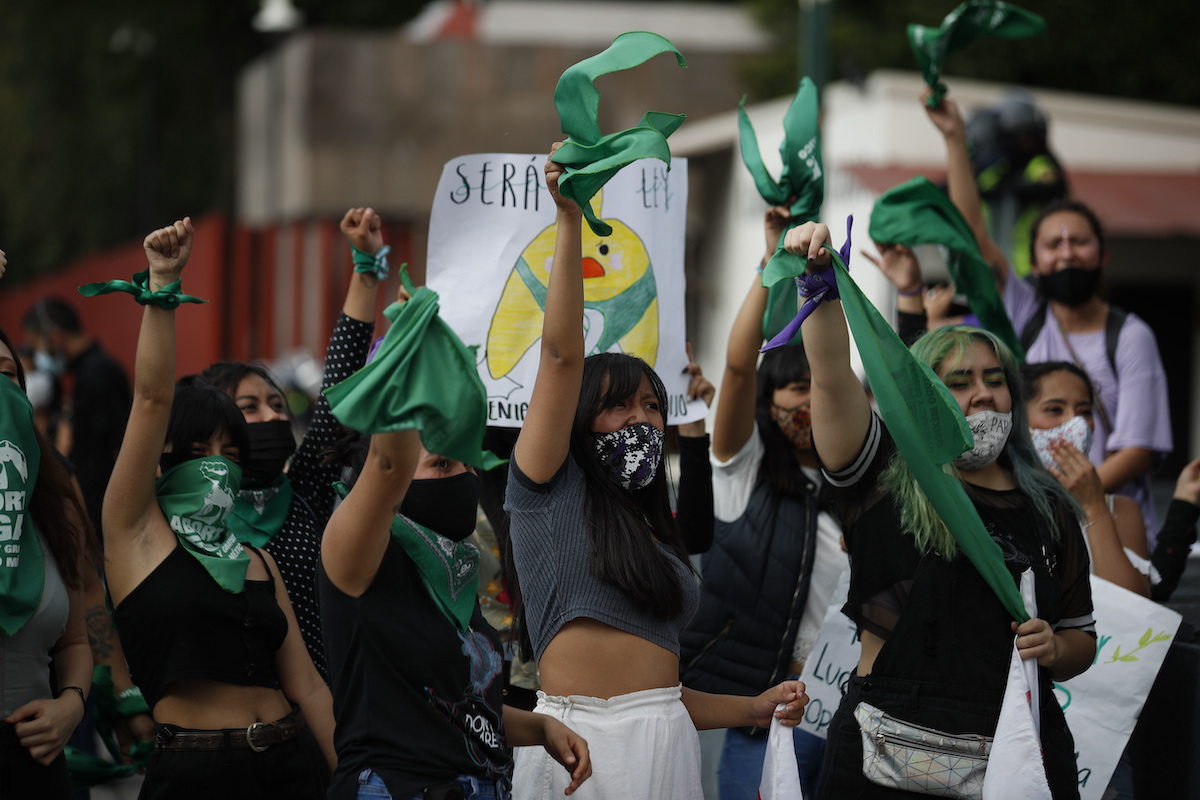

Protestors calling for legal and safe abortion throughout the country demonstrate in front of the National Congress on the “Day for Decriminalization of Abortion in Latin America and the Caribbean,” in Mexico City, Monday, September 28, 2020.(AP Photo/Rebecca Blackwell)
The most important Catholic country in Latin America is today a feminist reference. Abortion has been decriminalized in Mexico, setting a precedent for the rest of Latin America and the United States.
On Tuesday, Mexico’s Supreme Court said it was unconstitutional to criminalize abortion and voted unanimously to remove prison as a punishment for women who have abortions, something that was established in the state of Coahuila, where the penalties were from one to three years.
There are only four states in Mexico where abortion is decriminalized in the first 12 weeks of gestation: Mexico City, Oaxaca, Hidalgo and Veracruz.
The ruling does not guarantee that abortion will be legal throughout the country, but it sets a precedent for the laws in several states and provides a judicial argument for women who are prosecuted for having an abortion.
“As of today, [the rulling] is a watershed in the history of the rights of all women, especially the most vulnerable.”, said Mexican Judge Arturo Zaldívar after the resolution was announced.
Las leyes que criminalizan el aborto de manera absoluta son inconstitucionales. A partir de ahora todas y todos los jueces deberán aplicar este criterio de la Corte que protege el derecho de las mujeres y personas gestantes a decidir.
Conoce más ⬇️ pic.twitter.com/vQRCks9Oqe
— Suprema Corte (@SCJN) September 8, 2021
How the Decision Was Reached
Although Mexico’s justices are in the media spotlight for the decision, Mexican feminist activism and grassroots organizations take full credit for the ruling. For years, feminists have organized to demand justice for femicides and to call for women to decide about their bodies, especially those with limited economic resources.
Sofía Garduño, the coordinator of El Fondo de Aborto para la Justicia Social MARIA —one of the most important organizations in guaranteeing access to safe abortion in Mexico— told Latino Rebels on Wednesday that the ruling is the result of feminist resistance to a large extent.
“I believe that one of the most important roles played by feminist organizations has to do with the change of discourse and the change of narratives. It is the sentence. It puts reproductive freedom and autonomy at the center,” Garduño said.
When it comes to abortion, economic resources are key to access. That is why the ruling is seen as a possible path to equality. The director of feminist magazine Volcánicas, Catalina Ruiz-Navarro, told Latino Rebels that the court’s decision sets a precedent for access to this right for women who did not have the resources to mobilize and have a safe abortion.
“What had happened until now was that women who had to have an abortion and had the economic conditions traveled to Mexico City to have an abortion. Just like the Central American women who could afford the trip, they also did that. They would come to Mexico City to have an abortion. And that, of course, means [it’s] an elite and class matter,” Ruiz- Navarro said.
The Mexican Supreme Court’s decision will have an impact in Latin America, especially in countries with strict regulations, such as El Salvador, Honduras, Nicaragua and the Dominican Republic, which have absolute prohibitions and penalties.
The reaction can either be the next step to Latin American feminist “green tide” led by organizations that promote access to abortion or a push by conservatives to limit abortion—like what happened in Honduras weeks after the legalization of abortion in Argentina. In this Central American country, there is a ban on any law or lawsuit that would decriminalize abortion.
“There is no homogeneous advance of the green tide. It is that in some parts progress is being made and in other parts, they are backing out in a very radical way,” Ruiz-Navarro added.
Mexico vs. Texas
It is impossible not to mention the recently passed Texas abortion ban, one of the most restrictive in the United States. The Republican-led state has set a precedent for how it can legislate over women’s bodies, backed by the Supreme Court in a country that is not governed by religion, unlike Mexico where Catholic devotion is very strong.
“The first thing these scenarios tell us is that rights cannot be taken for granted. And two, that the United States is not different from Latin American countries as we have been led to believe. The United States is a country that has a lot of money but has very large inequality gaps, as large as those we have in Latin America,” Ruiz-Navarro explained.
According to activists and organizers, the Texas decision affects immigrants, undocumented women and those who cannot travel to access an abortion, as was the case in Mexico.
For Sofia Garduño, what is expected from this type of decision is a response from conservatives—which is why activism and organizing are of vital importance. And although it is a triumph for rights, Garduño noted, pro-choice opponents cannot let their guard down, especially in countries where not even the grounds for abortion are recognized or even in places like the United States.
***
Juanita Ramos Ardila is a Colombian journalist who has written for El Tiempo and ColPrensa. An M.A. Journalism candidate at CUNY’s Newmark Graduate School of Journalism, Juanita is also Latino Rebels’ 2021 Summer Correspondent. Twitter: @JuanitaRamosA.



[…] December 2020, Argentina, Chile, and Mexico have legalized or decriminalized abortion, putting the debate in the spotlight. Regional advocates […]
[…] then, bandana-clad demonstrators have pushed for massive expansions in both Mexico’s and Colombia’s reproductive rights, and pro-choice advocates the world over have taken the color […]